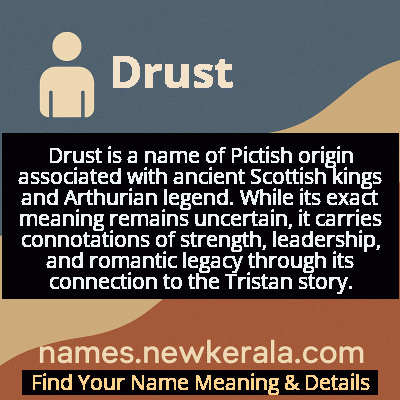Drust Name Meaning & Details
Origin, Popularity, Numerology Analysis & Name Meaning of Drust
Discover the origin, meaning, and cultural significance of the name DRUST. Delve into its historical roots and explore the lasting impact it has had on communities and traditions.
Name
Drust
Gender
Male
Origin
Arthurian
Lucky Number
1
Meaning of the Name - Drust
Drust is a name of Pictish origin associated with ancient Scottish kings and Arthurian legend. While its exact meaning remains uncertain, it carries connotations of strength, leadership, and romantic legacy through its connection to the Tristan story.
Drust - Complete Numerology Analysis
Your Numerology Number
Based on Pythagorean Numerology System
Ruling Planet
Sun
Positive Nature
Leaders, ambitious, highly driven, self-reliant, innovative.
Negative Traits
Overly aggressive, domineering, impatient, selfish.
Lucky Colours
Red, orange, gold.
Lucky Days
Sunday.
Lucky Stones
Ruby, garnet.
Harmony Numbers
2, 3, 9.
Best Suited Professions
Entrepreneurs, managers, engineers.
What People Like About You
Courage, determination, leadership.
Famous People Named Drust
Drust I
Pictish King
First historically recorded king of the Picts, ruling around 412-452 AD
Drust mac Erp
Pictish King
Legendary Pictish ruler who appears in early medieval chronicles and may have fought against the Scots
Drust Gurthinmoch
Pictish King
Semi-legendary ruler credited with establishing Pictish royal succession traditions
Drust of the Hundred Battles
Legendary Warrior
Mythological figure in Celtic lore who fought numerous battles against invading forces
Name Variations & International Equivalents
Click on blue names to explore their detailed meanings. Gray names with will be available soon.
Cultural & Historical Significance
In Arthurian context, Drust evolves into the more familiar Tristan, becoming central to one of the great medieval romances. This transformation from historical Pictish king to romantic hero illustrates how Celtic names and stories were adapted into the broader European literary tradition. The dual identity of Drust—as both historical ruler and romantic hero—makes it a unique bridge between documented history and literary mythology. This cultural journey from Pictish chronicles to Arthurian romance demonstrates the enduring power of Celtic names to capture imagination across centuries and cultural boundaries.
Extended Personality Analysis
Those named Drust typically exhibit a blend of practical leadership and deep emotional intensity, reflecting the name's dual heritage as both royal and romantic. They often possess natural authority and strategic thinking, capable of making difficult decisions while maintaining their principles. This practical side is balanced by a strong sense of loyalty and commitment to personal relationships, mirroring the Tristan connection in Arthurian legend. Drusts tend to be protective of their loved ones and values, showing fierce determination when their principles are challenged.
The historical weight of the name often instills a sense of responsibility and connection to tradition in those who bear it. They may feel drawn to understanding their heritage and preserving cultural knowledge. At the same time, the Arthurian association gives them a romantic, idealistic streak that can surprise those who only see their practical exterior. This combination makes Drusts complex individuals who balance worldly competence with deep emotional capacity, often becoming the steady center in turbulent situations while maintaining their own rich inner world of ideals and passions.
Modern Usage & Popularity
In contemporary naming practices, Drust remains an uncommon but meaningful choice, primarily embraced by families with Scottish heritage or those particularly interested in Celtic history and Arthurian legends. The name has experienced a modest revival in recent decades as part of the broader trend toward unique, historically grounded names that stand out from more common choices. It's most frequently encountered in Scotland, particularly in areas with strong Pictish historical connections like Aberdeenshire and the Highlands, though it also appears among Scottish diaspora communities in North America and Australia. While it doesn't rank on official baby name charts, Drust maintains a consistent presence in historical reenactment communities, Celtic studies circles, and among parents seeking a name that combines warrior strength with romantic Arthurian connections without being overly common.
Symbolic & Spiritual Meanings
Symbolically, Drust represents the enduring power of cultural memory and the transformation of historical figures into mythological archetypes. The name embodies the mysterious legacy of the Picts—a civilization that left few written records but profoundly influenced Scottish identity. It symbolizes resilience and adaptation, as the name survived the disappearance of the Pictish kingdom to become part of Arthurian romance. Drust also carries connotations of bridge-building between different cultures and eras, representing how names and stories evolve while retaining their core identity. The symbolic meaning extends to representing the tension between duty and passion, reflecting both the practical leadership required of historical kings and the romantic intensity of the Tristan legend. Ultimately, the name symbolizes how personal identity connects to broader historical and cultural narratives.

